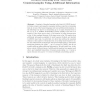Free Online Productivity Tools
i2Speak
i2Symbol
i2OCR
iTex2Img
iWeb2Print
iWeb2Shot
i2Type
iPdf2Split
iPdf2Merge
i2Bopomofo
i2Arabic
i2Style
i2Image
i2PDF
iLatex2Rtf
Sci2ools
106
click to vote
ALT
2009
Springer
2009
Springer
Iterative Learning from Texts and Counterexamples Using Additional Information
Abstract. A variant of iterative learning in the limit (cf. [LZ96]) is studied when a learner gets negative examples refuting conjectures containing data in excess of the target language and uses additional information of the following four types: a) memorizing up to n input elements seen so far; b) up to n feedback memberships queries (testing if an item is a member of the input seen so far); c) the number of input elements seen so far; d) the maximal element of the input seen so far. We explore how additional information available to such learners (defined and studied in [JK07]) may help. In particular, we show that adding the maximal element or the number of elements seen so far helps such learners to infer any indexed class of languages class-preservingly (using a descriptive numbering defining the class) — as it is proved in [JK07], this is not possible without using additional information. We also study how, in the given context, different types of additional information far...
Related Content
| Added | 14 Mar 2010 |
| Updated | 14 Mar 2010 |
| Type | Conference |
| Year | 2009 |
| Where | ALT |
| Authors | Sanjay Jain, Efim B. Kinber |
Comments (0)

